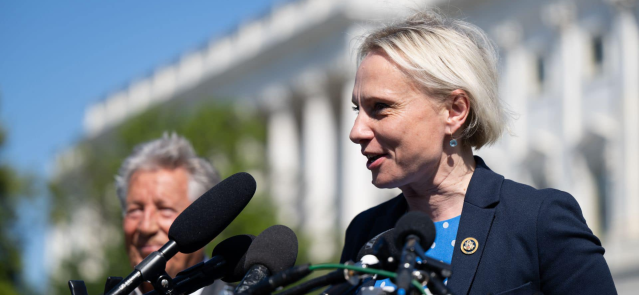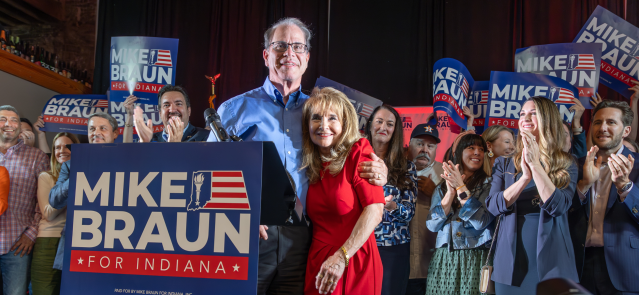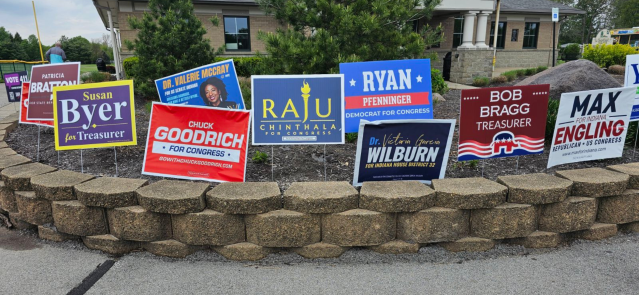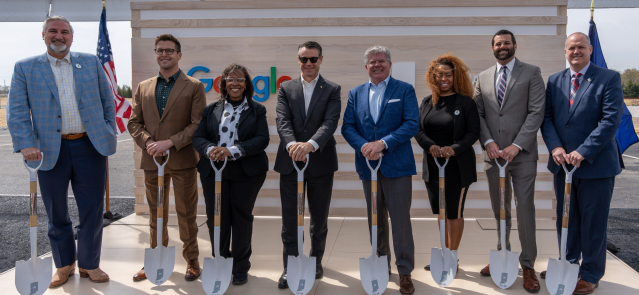Stay ahead of the curve as a political insider with deep policy analysis, daily briefings and policy-shaping tools.
Request a Demo‘Island of prohibition:’ Other red states have legalized marijuana. Why not Indiana?

Illustration by Brittney Phan (State Affairs)
- Indiana is one of 12 states that hasn't yet legalized marijuana either for medical or recreational purposes.
- Just 15% of Hoosiers are opposed to any type of marijuana legalization, according to a Ball State University study.
- Of the Republican gubernatorial candidates who responded to State Affairs, only Brad Chambers left the door open for potential marijuana legalization.
The gist
Indiana is surrounded by states that have legalized marijuana in some form, but the likelihood of that happening here in the near future is slim.
As multiple lawmakers put it, Indiana is an “island of prohibition.”
There are signs of movement: Lawmakers will study the impact of marijuana legalization in an interim committee next week, and last legislative session legislators heard testimony on a bill to decriminalize marijuana for the first time.
But the committee chair never called the bill for a vote, and proponents of legalization are all but certain legislation won’t move when the upcoming legislative session starts in January.
State Affairs talked to lawmakers, political experts and lobbyists to get a better picture of why Indiana is one of 12 states that hasn’t yet legalized the substance in any fashion, while some other red-leaning states have. They pointed to a lack of direct democracy in Indiana, the viewpoints of leaders at the Statehouse, and a generational gap between the House and Senate.
What’s happening
Democratic-leaning states initially took the lead on marijuana legalization, but over time other Republican-leaning states have started legalizing it for medical purposes too. That includes states like Indiana with Republican trifectas, such as North Dakota, South Dakota, West Virginia and Mississippi.

More than half the states that legalized cannabis have one thing in common: They left the decision to legalize it either medically or recreationally up to the voters themselves.
There are no citizen-led ballot initiatives in Indiana, which means all of the power lies within the Indiana General Assembly. The only initiatives Hoosiers can vote for are those that two separately elected General Assemblies pass to put on the ballot.
Typically state legislatures are behind state opinion on issues, said Chad Kinsella, director of the Bowen Center for Public Affairs at Ball State. That means states with a citizen-led ballot option can get controversial measures on the books more quickly.
That’s also why Hoosiers likely will never get the opportunity to vote on the legality of abortions.
“If the state legislature doesn’t move, then nothing moves,” Kinsella said. “You can collect signatures all day and nothing happens.”
Next door in Ohio, which has a Republican supermajority in both chambers like Indiana, voters will decide whether or not to legalize recreational marijuana this November.
Why isn’t there more movement in the legislature?
A lot of the pushback in Indiana is coming from the top.
Governors are considered weak in Indiana: Their vetoes can be overridden by a simple majority. But they still have sway within the legislature.
“The question becomes, ‘Is this an issue that legislators would be willing to override the veto of a governor of their own party?’” said North Liberty Republican Rep. Jake Teshka, who has pushed for legalization.
Republican Gov. Eric Holcomb has long said he opposes legalization, citing concerns about both its legality at the federal level and the impact on public safety and health.
“My thoughts haven’t changed one ounce,” Holcomb told State Affairs earlier this month. “If it is ushered through the proper FDA process for medicinal purposes I’m all for learning, just like for any other drug … I’m all for that.”
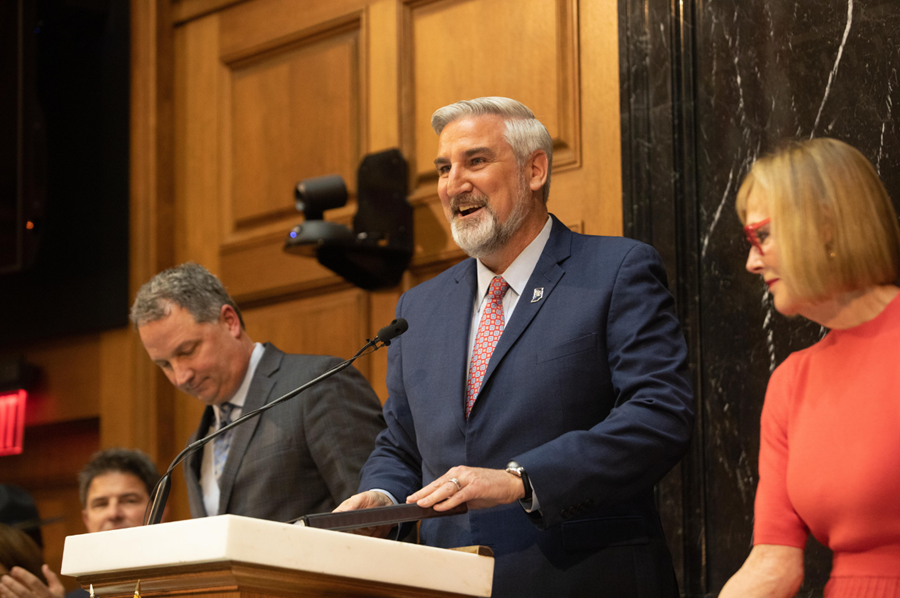
Likewise, House Speaker Todd Huston, R-Fishers, and Senate Majority Leader Rodric Bray, R-Martinsville, have voiced concerns about legalizing marijuana. During the last legislative session, Huston said he wanted to “continue to seek more information.”
Those leaders appoint committee chairs, which means they have outsized influence on which legislation gets a committee hearing or a vote.
Rep. Heath VanNatter, R-Kokomo, predicted the House is nearing 50% of support from Republicans as viewpoints have changed and new representatives were elected.
“I was opposed to it 13 years ago, and over the years I’ve visited other states and saw what was going on, and visited the facilities that produce it and sell it, and I’ve learned a lot about it,” VanNatter said. “I’ve changed my views on it, and I think more and more people are doing that.”
There are fewer Republican proponents in the Senate than the House. Perhaps nothing shows that more clearly than this: There was no second author on the bill Sen. Kyle Walker, R-Lawrence, filed last year to legalize cannabis.
“There’s probably more support than there’s ever been among legislators, but there’s still a tremendous amount of hesitancy,” Walker told State Affairs. “Some are philosophically opposed. Some are opposed because they believe that it would be harmful to society in general. There are some that are opposed because it’s federally illegal.”
So why is the Senate more hesitant? Teshka said it’s likely a generational issue. Typically, senators skew older than House representatives. In the House, the younger lawmakers have driven the momentum. The House is also by design more susceptible to the whims of the people since representatives are reelected every two years, rather than every four years.
There are other factors at play as well that impact the ability of marijuana legislation to move in both chambers, including voter apathy on the issue.
“The intensity is not there. This isn’t the issue that folks are calling their legislators on,” Teshka said. “Even if it’s polling really high, [if] legislators aren’t hearing about it in their town halls or in their email inboxes, the urgency is not going to be there to get something done.”
Historically, there’s also been opposition from some influential lobbyists, including the Indiana Chamber of Commerce.

Where the gubernatorial candidates stand on the issue
The future of cannabis legalization in Indiana could hinge on which gubernatorial candidate gets elected in 2024. Republicans specifically face a crowded, well-funded field, with multiple credible candidates.
Of the Republican gubernatorial candidates reached by State Affairs, only Brad Chambers, the former secretary of commerce, left the door open for potential marijuana legalization.
“I haven’t spent much time yet on this issue,” Chambers said in a statement, “but as we hear more about the potential of reclassification at the federal level, I think we should evaluate the potential positive and negative impacts, learn from what other states have experienced, and determine the best path forward for a healthy and successful Indiana.”
Former Attorney General Curtis Hill, Lt. Gov. Suzanne Crouch and businessman Eric Doden said they opposed legalization due to concerns ranging from public health to safety. Sen. Mike Braun declined to comment and Jamie Reitenour did not respond to a request for comment.
Jennifer McCormick, the former superintendent of public instruction and Democratic gubernatorial candidate, said she supported legalizing marijuana.
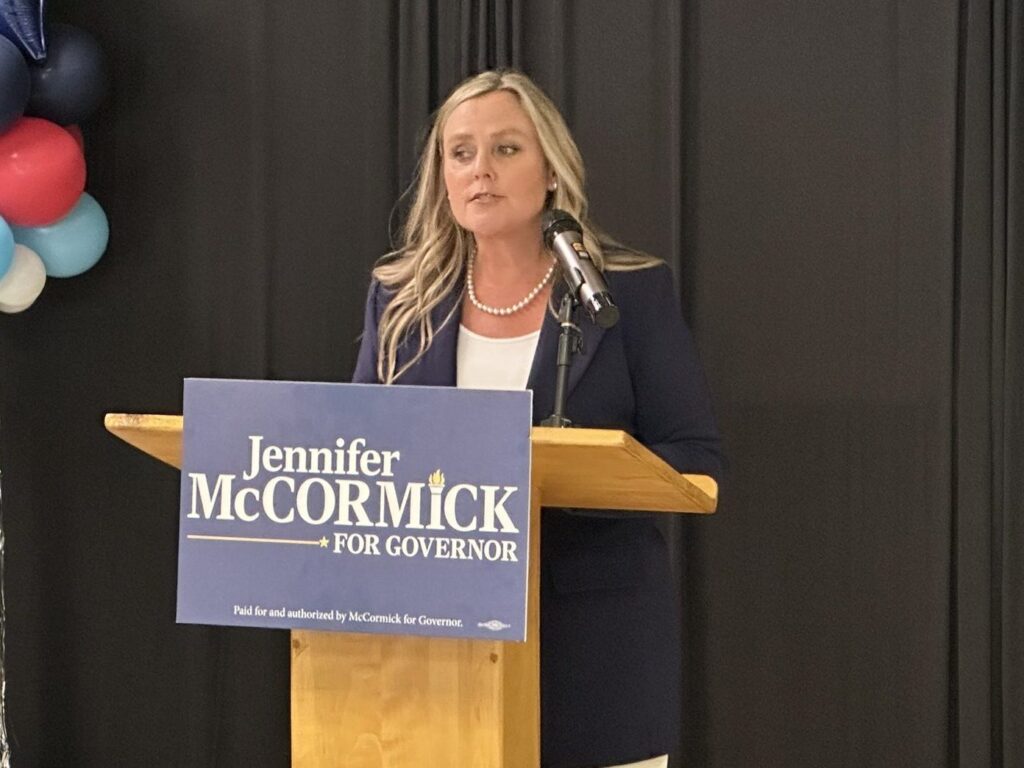
“It is time Indiana listened to the majority of Hoosiers and developed a legal, well-regulated cannabis market,” McCormick said in an emailed statement. “This opportunity would boost our economy by welcoming an industry proven to add millions of dollars to the state budget — just as 37 other states have demonstrated.”
Why it matters
The general public, regardless of political party, supports some form of legalization. Only 15% of Hoosiers don’t support either medicinal or recreational marijuana legalization, according to Ball State’s 2022 Hoosier Survey. Among Republicans, that number increases to just under 21%.
Kevin Brinegar, president and CEO of the Indiana Chamber of Commerce, said the Chamber has based its opposition on research, not public opinion.
“Part of the reason for opposition is the Food and Drug Administration has not approved marijuana for any valid medical purpose, and so until they do, we won’t even consider a position of support or even neutrality,” Brinegar said. “Our concern is the impact on the workplace, impact on traffic accidents, which impacts insurance rates and all that.”
The Chamber pointed to a report from Smart Approaches to Marijuana, a group focused on educating consumers on “the harms of marijuana legalization.” In its report, the group shared statistics on the increase in calls to poison control in some states that have legalized marijuana, the frequency in which road deaths in Colorado involve marijuana and the percent of marijuana consumers who have a marijuana use disorder.
Proponents of legalization, though, say some states have simply legalized cannabis incorrectly by taxing it too heavily, leading to a continuation of the black market. Indiana can do it better, they say. Plus, they say Hoosiers are already using marijuana whether it’s legal or not.
“We’re spending all of this money to put people away in jail and put their lives on hold,” said Sen. Rodney Pol, a Democrat from Chesterton who has authored legislation on the topic. “We’re spending money to do that to our population, and just across each border the other states are collecting hundreds of millions of dollars in tax revenue.”
In fiscal year 2022, state cannabis taxes generated a total of $2.9 billion in taxes across 11 states.
What’s next?
The Interim Study Committee on Commerce and Economic Development will hear from experts regarding marijuana legalization on Nov. 1. The committee will issue a final report that could contain recommendations for legislation on the topic.
Regardless of whether the committee issues recommendations, multiple lawmakers are considering filing legislation to legalize marijuana during the upcoming 2024 legislative session.
No bills are expected to move.
Still, Justin Swanson, a Bose McKinney & Evans partner who lobbies for pro-cannabis groups, sees any progress as a win. Indiana has taken some baby steps, first by legalizing Cannabidiol oil, which is a low-THC product derived from cannabis plants.
Swanson particularly viewed last year’s committee hearing on a bill to decriminalize marijuana as a victory.
“The legislative process is designed to be slow moving, so we’ve kind of learned to redefine success as we go on this issue,” Swanson said. “That [committee hearing] was a huge win. And,frankly, I think it kind of marked the beginning of the end of prohibition in Indiana.”
Check out our summary on TikTok.
Contact Kaitlin Lange on X @kaitlin_lange or email her at [email protected].
Facebook @stateaffairsin
Instagram @stateaffairsin
LinkedIn @stateaffairs
State Affairs reporter Tom Davies contributed to this article.
Header image: (Credit: Brittney Phan)
Know the most important news affecting Indiana
Get our free weekly newsletter that covers government, policy and politics that impact your everyday life—in 5 minutes or less.
Unlimited Access: Subscribe for just $2.99/mo billed monthly.
Subscribe NowGet unlimited news access
Already a member? Login here
Spartz, Shreve, Stutzman win Republican congressional primaries
A central Indiana congresswoman successfully fought off eight primary challengers, while crowded races for three other Republican-leaning congressional districts began to clear in Tuesday’s primary election. And in northeastern Indiana, a former congressman held on in a tight race as he seeks to return to Congress. All of the state’s nine U.S. House of Representatives …
Mike Braun wins the Indiana Republican nomination for governor
U.S. Sen. Mike Braun was declared the winner of the Republican gubernatorial nomination shortly after polls in Indiana’s Central Time Zone closed. With 17% of precincts reporting, Braun had 39.1%, followed by Lt. Gov. Suzanne Crouch with 21.4%, Brad Chambers with 17.5% and Eric Doden with 14.2%. Results are preliminary until the primary is certified by …
Here’s how to vote in Indiana’s primary election
Thousands of Hoosier voters will head to the polls Tuesday, May 7, for Indiana’s primary election. This year’s ballot includes a competitive contest for governor, as well as dozens of state and federal legislative races and a few school referenda. The primary will decide which candidates will represent their respective parties in the Nov. 5 …
$15B in 72 hours: ‘Our economy is on fire,’ says Commerce chief
A banner week for investment within Indiana has capped off the state’s biggest financial quarter in recent history, as three major companies agreed to deals estimated to bring in billions of dollars.
The state has long advertised itself as business-friendly, and its chief executive appeared thrilled by the week’s news.
“This is about $15 billion in about 72 hours,” Gov. Eric Holcomb told reporters on Friday. “This used to take four years to achieve.”
One announced project, an $11 billion Amazon Web Services data center in north-central Indiana, is the biggest single investment in the state’s history.
Google also broke ground on a $2 billion data center near Fort Wayne, while Toyota announced a $1.4 billion investment in its Princeton plant.
“Our economy is on fire,” Secretary of Commerce David Rosenberg said.
His agency, the Indiana Economic Development Corp., negotiated the deals. The state is offering millions of dollars in tax incentives in order to create some 1,500 new jobs.
“These industries bring generational change for families, putting more money in their pockets and allowing them the opportunity to have a better quality of life on their own,” Rosenberg said.
The projects
Amazon’s new data center will be built near New Carlisle. It’s expected to bring in at least 1,000 new jobs in the artificial intelligence and cloud storage sectors. No timetable for completion of the project was given.
According to Amazon, the company has invested $21.5 billion in Indiana since 2010, creating 26,000 full- and part-time jobs.

Google’s new data center will hire up to 200 new workers, the tech giant said, “in the coming years.”
Toyota will build a new assembly line that will assemble battery-operated SUVs by the end of 2025. It expects to add up to 340 new jobs to the plant, which Toyota said now employs more than 7,500.
The company has spent $8 billion on the Princeton plant since breaking ground in 1996, Toyota said.
The new projects’ figures represent early estimates and could change as they move forward.
Incentives aren’t the only factor
Rosenberg praised the Indiana General Assembly for passing legislation that allows the state to offer sales tax exemptions as a lure for new businesses. Both Amazon and Google will receive such boosts, and the Amazon project could receive up to $100 million in additional credits based on various incentives.
But Rosenberg stressed tax breaks are only part of the equation as the state looks to compete internationally.
“We don’t have to have the highest offer because we bring the university partners, the state and local governments, utilities — everyone around the table to make sure that company has what they need,” he said.
The Google project, for example, includes partnerships with Ivy Tech Community College on a new job training program and Indiana Michigan Power to bring clean energy resources to the local grid.
Recruiting new industries
Rosenberg said tech recruitment has been a particular focus for the IEDC, as Indiana is looking to provide an “ecosystem” for these companies to thrive off one another. The state’s semiconductor facilities will provide the materials needed for these new data centers, he noted.
Recruiting new business takes anywhere between six months to several years. Zoning, road construction, utilities and more need to be worked out ahead of time.
The IEDC has been on a hot streak, Rosenberg said. During the agency’s first 11 years, it secured just under $50 billion in new projects. It has now pulled in more than $71 billion since the beginning of 2022.
In the first four months of 2024, $20.68 billion has been pledged to projects in Indiana — the most for a quarter since IEDC’s founding in 2005.
‘Strong partners for the Indiana economy’
“The key is that these investments represent long-lasting and continued commitment to being strong partners for the Indiana economy,” said Andrew Butters, an associate professor of business economics and public policy at Indiana University’s Kelley School of Business.
Large companies came out of the pandemic looking to reorient their supply chains, Butters said, and some states have reaped the benefits of projects that might have previously moved overseas.
Indiana has been able to compete by selling its location, workforce, labor force participation in addition to offering incentives, Butters said.
“I would not be shocked to see more of these as the state attempts to transition toward more high-tech and high-skill industries,” Butters said.
Contact Rory Appleton on X at @roryehappleton or email him at [email protected].

